About
The Nanobioengineering group is a truly multidisciplinary team composed by researchers coming from very diverse backgrounds working together in applying nanotechnology for the development of new biomedical systems and devices, mainly for diagnostic purposes, and integrated microfluidic Organ-on-Chip devices for the study of organ physiology, disease etiology, or drug screening.
The goal is to fabricate microsystems containing living cells that recapitulate tissue and organ level functions in vitro and new portable diagnosis devices that can be used as Point-of-Care systems.
The main research activities of the group include the engineering and biochemical functionalization of biomaterials integrated with microfluidics systems. The bioengineered microdevices are used to study cell responses to biomolecular compounds applied to Organ-on-Chip devices, or for the development of new lab-on-a-chip based biosensors.
The projects carried out by the group are focused on clinical and industrial problems and are related to three convergent research lines:
1. Biosensors and Lab-on-a-Chip devices for clinical diagnosis and monitoring
- DNA sensors-arrays integrated in lab-on-a-chip for portable point of care diagnosis
- Vascular implantable sensors for circular cancer biomarker detection.
- Antibody-based sensors for pathogenic microorganisms’ detection and neurodegenerative early detection
- Implantable physiological sensors-array for tissue in vivo hypoxia and ischemia monitoring.
- 3D printing microfluidic technology.
- Microfluidic chip using hydrodynamic forces for cell counting and sorting. Application for detection of circulating tumours cells (CTCs).
2. Nanotechnology applied to biomolecule interaction studies and micro/nano-environments for regenerative medicine applications
- Development of bioengineered 2D and 3D micro/nanoenvironments with a topography and chemical composition controlled at the nanoscale for cell behavior studies (adhesion, proliferation, differentiation). Application to musculoskeletal system regeneration.
- Biophysical description of cellular phenomena (adhesion, cell migration, differentiation) using micro/nanotechnologies, cell biology tools and soft matter physics.
- Study of biological mechanisms at single molecule level.
- Study of magnetite nanoparticles – Amyloid-Beta interaction in Alzheimer disease.
3. Microfluidic systems for biological studies and Organ-on-Chip devices
- Microfluidic chip for blood/plasma filtering and anemia diseases characterization
- Spleen-on-a-chip development.
- Nanoporous-based systems for kidney-on–a-chip developments.
- Engineering microfluidic platforms for neurobiological studies.
- Development of 3D neuromuscular tissue models for soft robotics and clinical applications
- Microfluidic system to monitor cancer therapy response. Tumor Cancer on a chip in vitro development.
- Microfluidic vessel on-a-chip for screening drug delivery systems.
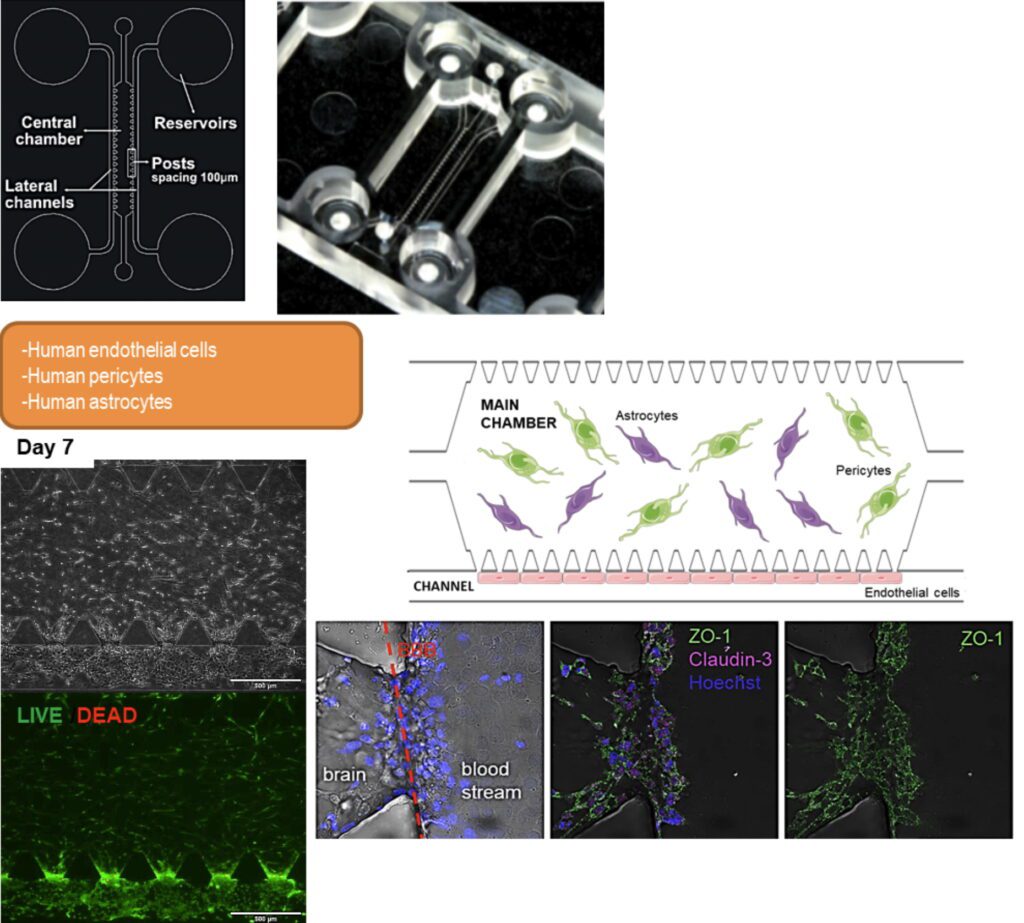
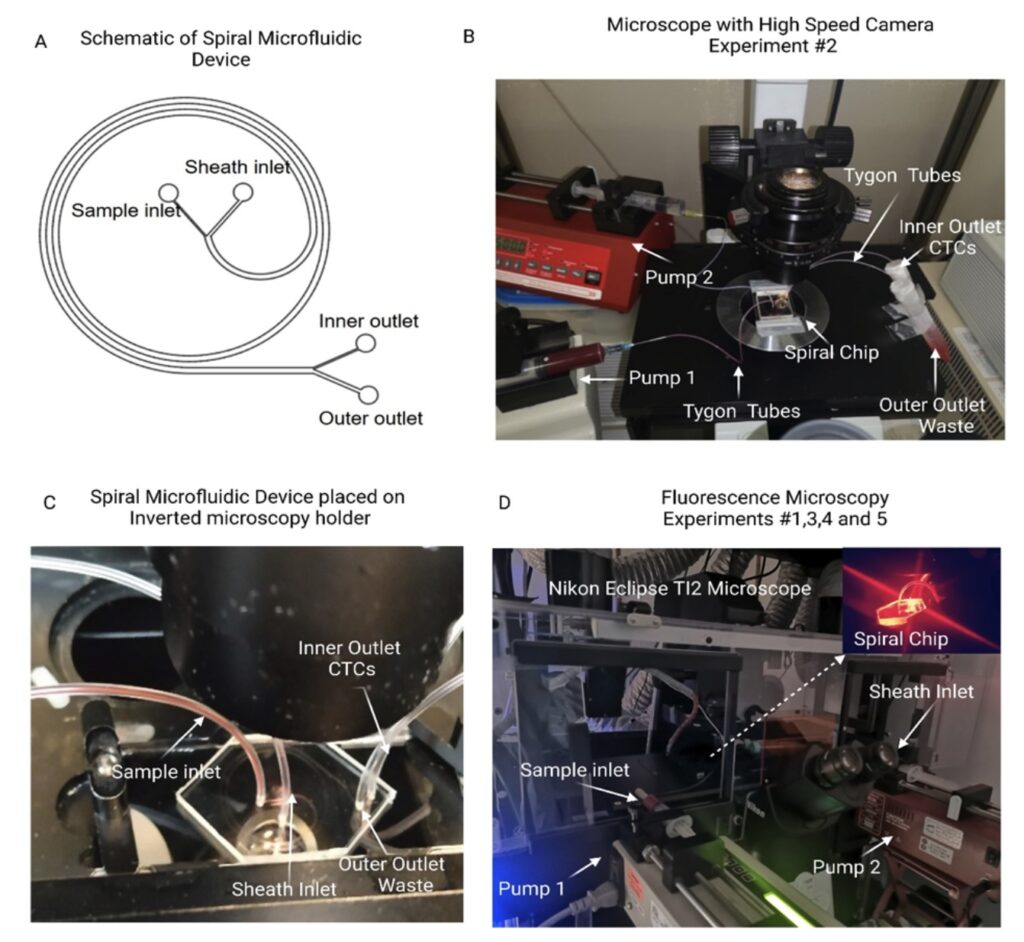
Microfluid System for Circulating Tumour Cells isolation in Blood.
Staff
Projects
| NATIONAL PROJECTS | FINANCER | PI |
|---|---|---|
| BASE3D (2019-2022) | RIS3CAT Tecnologies Emergents | Josep Samitier |
| PREMED Desarrollo de un ensayo microfluídico funcional en células para el tratamiento personalizado contra el cáncer (2019-2022) | MICIU: Retos investigación | Joan Montero |
| Sistema microfisiológico para mimetizar las barreras hemato-sistema nervioso central: aplicación a la esclerosis lateral amiotrófica (2019-2022) | MICIU: Retos investigación | Anna Lagunas |
| BATMAN Nanopartículas biomiméticas para el tratamiento dirigido del neuroblastoma pediátrico (2021-2023) | MICIU, Retos investigación: Proyectos I+D. | Aranzazu Villasante |
| Neuroblastoma en un chip para investigar la resistencia a fármacos y el uso de nanopartículas terapéuticas (2018-2022) | Asociación Española contra el Cáncer (AECC) | Aranzazu Villasante |
| Evaluación Funcional de respuesta celular a la quimioterapia neoadyuvante en Sarcoma de tejido blando (2021-2024) | Fundación Mari Paz Jiménez Casado (FMPJC), Beca Trienal FMPJC Investigación Sarcomas | Joan Montero |
| INTERNATIONAL PROJECTS | FINANCER | PI |
|---|---|---|
| ASCTN-Training Training on Advanced Stem Cell Technologies in Neurology (2018-2022) | European Comission Marie Curie ITN | Josep Samitier |
| EVIDENCE Erythrocytes properties and viability in dependence of flow and extra-cellular environment (2020-2023) | European Comission Marie Curie ITN | Josep Samitier |
| PANDORA Pandemics Outbreaks Rationalized: towards a universal therapy to eliminate intracellular pathogens (2020-2025) | European Commission, ERC – StG | Josep Samitier |
| BEST Postdoctoral Programme in Bioengineering Excellence Scientific Training (2017-2022) | European Commission, COFUND – Marie Sklodowska-Curie Co-funding of regional, national and international programmes | Josep Samitier |
| SCIFI From Scientists to Innovators for Industry (2022-2024) | EIT Health, EITHealth BP2022 Education | Josep Samitier |
| PRIVATELY-FUNDED PROJECTS | FINANCER | PI |
|---|---|---|
| Descubrimiento de nuevos marcadores terapéuticos en neuroblastoma mediante la generación de modelos basados en técnicas de ingeniería de cáncer (2021-2023) | Associació pacients NEN | Josep Samitier /Aranzazu Villasante |
| Understanding and measuring mechanical tumor properties to improve cancer diagnosis, treatment, and survival: Application to liquid biòpsies (2017-2022) | Obra Social La Caixa | Josep Samitier |
| BCNatal Artificial Placenta Project (2021-2022) | Obra Social La Caixa | Maria José López |
| Descubrimiento de nuevos marcadores terapéuticos en neuroblastoma mediante la generación de modelos basados en técnicas de ingeniería de cáncer (2021-2023) | Associació pacients NEN | Aranzazu Villasante |
| FINISHED PROJECTS | FINANCER | PI |
|---|---|---|
| Personalizing pediatric cancer treatment with kinome analyses, cell-based funcional assays and microfluidics (2017-2021) | CELLEX | Josep Samitier / Joan Montero |
| ISCHEMSURG Miniaturized electrochemical sensor for monitoring of free flap ischemia in post-surgery (2019-2021) | AGAUR | Josep Samitier |
| Joint Programme – Healthy Ageing (2016) | Obra Social «La Caixa» | Josep Samitier |
| PLANTOID Innovative Robotic Artefacts Inspired by Plant Roots for Soil Monitoring | ICT | Josep Samitier |
| Universal diagnostic platforms based on oligonucleotide cofidied nanoparticles and DNA microarray sensor devices | MINECO, I+D-Investigación fundamental no orientada | Josep Samitier |
| ELECTRA-G (2014-2016) | Conveni GENOMICA S.A.U. | Josep Samitier |
| Desarrollo de una nueva tecnología lab-on-a-chip para la detección y cuantificación de secuencias de ADN/ARN (2014-2016) | Conveni GENOMICA S.A.U. | Josep Samitier |
| BIOBOT Engineered biological soft robots based on neuro-muscular junction control (2015-2018) | MINECO, Proyectos EXPLORA Ciencia / Tecnología 2015 | Josep Samitier |
| Advancecat Acceleradora pel desenvolupament de teràpies avançades | ACCIÓ / Smart Specialization funds (RIS3) | Josep Samitier |
| MINDS Plataforma MIcrofluídica 3D de cultivo Neuronal compartimentada para el estuDio de enfermedades neurológicaS (2016-2018) | MINECO, Proyectos I+D Excelencia | Josep Samitier |
| nanoET-leukemia Nanoconductance of electron transfer proteins of the respiratory chain. Direct measurementat the single molecular level and therapeutic regulation in cancer stem cells (2015-2018) | MINECO, Proyectos RETOS 2015 / CIBER | Anna Lagunas / Marina Giannotti |
| Desenvolupar un sistema d’assistència robòtica per medicina i cirurgia fetal (2016-2019) | CELLEX | Josep Samitier |
| Monitoring neurocognitive deficits in Alzheimer’s and Parkinson’s diseases using saliva or blood-derived biomarkers and a multiplexed approach (2016-2018) | Obra Social «La Caixa» | Josep Samitier |
| ISCHEMSURG Miniaturized electrochemical sensor for monitoring of free flap ischemia in post-surgery (2019-2020) | CaixaImpulse | Monica Mir |
| Personalizing Melanoma Treatment Using Dynamic BH3 Profiling (2018-2020) | Dana-Farber Cancer Institut | Joan Montero |
| NANOVAX Nanovacunas diseñadas para inmunoterapia antitumoral (2016-2020) | EuroNanoMed (ERA-Net) | Josep Samitier |
| Understanding and measuring mechanical tumor properties to improve cancer diagnosis, treatment, and survival: Application to liquid biopsies (2017-2020) | Obra Social «La Caixa» | Josep Samitier |
| Personalizing pediatric cancer treatment (2018-2020) | Fundación FERO | Joan Montero |
Publications
Check for more detailed information on the outputs of the Group at IBEC CRIS portal.
Publications list:
Equipment
Nanofabrication and nanomanipulation
- 3D Printing system for microfluidic devices
- Graphtech
Characterization
- Potentiostates
- Optical Waveguide Lightmode Spectroscope (OWLS)
- Atomic Force Microscope (AFM)
- Optical Microscopes (white light/epifluorescence)
- Electrical Impedance spectroscopy (EIS)
- Multi-frequency Lock-in Amplifier
- Sub-femtoamp Remote SourceMeter Instrument
Molecular/cell biology
- Biological safety cabinet (class II)
- Microwell plate readers
- Protein and DNA electrophoresis systems
- Microincubator Okolab
- Nanodrop spectrophotometer
- CO2 incubator for cells: Galaxy® 48 S, 48 L, 230 V/50/60 Hz, standard
- Cell culture cabin: Bioii-Advance 3
Microfluidics
- High precision syringe pumps
- Peristaltic pumps
Collaborations
- Prof. Fernando Albericio
Institut de Recerca Biomédica (IRB), Barcelona, Spain - Dr. José Antonio Andrades
Universidad de Málaga, Spain - Prof. Ezequiel Pérez
Inestrosa Centro Andaluz de Nanomedicina y Biotecnología (BIONAND), Málaga, Spain - Prof. Joan Bausells
Centro Nacional de Microelectrónica (CNM-CSIC), Barcelona - Prof. Albert van den Berg
University of Twente, The Netherlands - Prof. Andre Bernard
Institut für Mikro- und Nanotechnologie (MNT-NTB), Buchs, Switzerland - Prof. H. Börner
Max Planck Institute of Colloids and Interfaces, Golm, Germany - Prof. Josep Maria Canals
University of Barcelona, Spain - Dr. Matthew Dalby
University of Glasgow, UK - Prof. Paolo Dario
Scuola Superiore Sant’Anna (SSSA), Pontedera, Italy - Prof. Ramón Eritja
Institut de Recerca Biomédica (IRB), Barcelona, Spain - Prof. E. Faszewski
Wheelock College, Boston, USA - Prof. G. Fuhr
FhG Biomedicine, St. Ingbert, Germany - Dr. Juan C. Izpisúa
Salk Institute for Biological Studies, La Jolla, California - Dr. Nicole Jaffrezic
Université Claude Bernard Lyon 1, France - Dr. Graham Johnson
Uniscan Instruments Ltd, Buxton, UK - Dr. Mª Pilar Marco
Institute of Chemical and Environmental Research, Barcelona - Prof. Jean-Louis Marty
Université de Perpignan Via Domitia, France - Prof. Barbara Mazzolai
IIT Center for Micro-BioRobotics (CMBR), Pontedera, Italy - Dr. Edith Pajot
Biology of Olfaction and Biosensors group (BOB) at INRA, Jouy-en-Josas, France - Dr. M. Lluïssa Pérez
Dept. Farmacología, University of Barcelona, Spain - Dr. Hernando del Portillo
Centro de Investigación en Salud Internacional de Barcelona (CRESIB), Barcelona, Spain - Dr. Jaume Reventós
Hospital Vall d’Hebrón, Barcelona, Spain - Prof. L. Reggiani
Nanotechnology Laboratory, INFM, Lecce, Italy - Prof. Daniel Riveline
Laboratory of Cell Physics ISIS/IGBMC, Strasbourg - Prof. M. Sampietro
Politecnico di Milano, Italy - Prof. Molly M. Stevens
Imperial College, London, UK - Dr. Christophe Vieu
Laboratoire d’analyse et d’architectures des systèmes (LAAS-CNRS), Toulouse, France - Prof. Pau Gorostiza
IBEC - Prof. Irene Díaz Moreno
3IIQ-cicCartuja, Universidad de Sevilla-CSIC, Spain - Prof. Miguel A. de la Rosa
3IIQ-cicCartuja, Universidad de Sevilla-CSIC, Spain - Dr. María del Mar Mañú Pereira
Josep Carreras Leukaemia Research Institute, Barcelona, Spain - Dr. Joan Lluis Vives
Josep Carreras Leukaemia Research Institute, Barcelona, Spain
Industry partners:
- Biokit S.A. (Werfen group); Genomica S.A.U. (Zeltia group); Tallers Fiestas S.L.; Enantia S.L.; Microfluidic ChipShop GmbH; Minifab; Microliquid
News
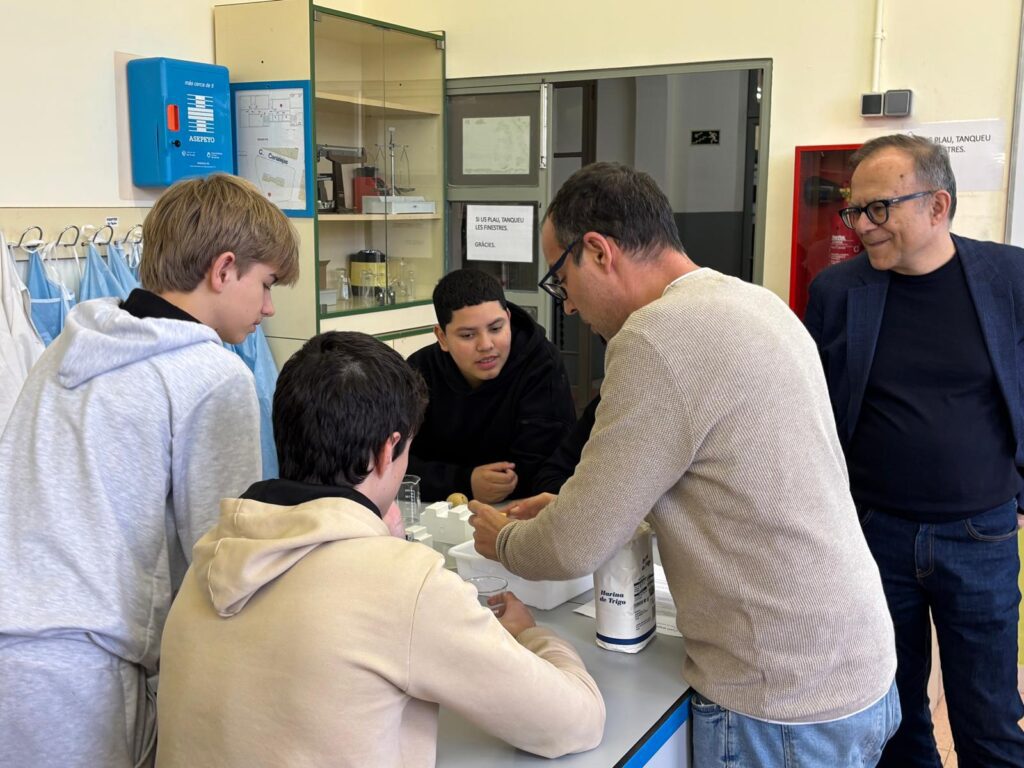
El IBEC y el Instituto Lluís Vives de Barcelona se alían para incorporar la investigación científica al centro
En el marco del programa Magnet. Alianzas por el éxito educativo, la colaboración entre el Instituto de Bioingeniería de Cataluña (BEC) y este IES de Sants promueve la integración de la investigación en el aprendizaje competencial del alumnado. El alumnado trabaja proyectos científicos reales sobre salud, cuerpo humano, biología celular y medio ambiente, entre otros, con el apoyo de investigadoras del IBEC y el acompañamiento formativo al claustro.
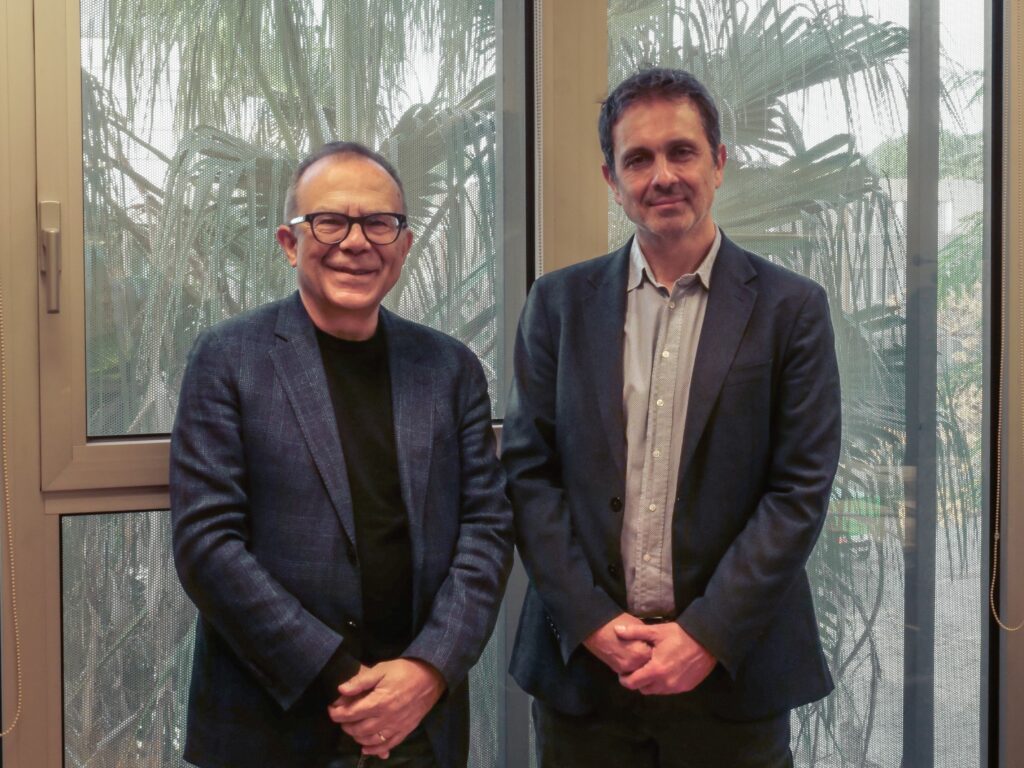
Josep Samitier deja la dirección del IBEC después de trece años
Josep Samitier dejará la dirección del Instituto de Bioingeniería de Cataluña (IBEC) el 31 de diciembre de 2025. Bajo la dirección de Samitier desde 2013, el IBEC se ha consolidado como un referente en bioingeniería, destacando como una institución líder en investigación de excelencia en España. Manuel Salmeron, profesor ICREA en el IBEC, se hará cargo de la dirección interina del IBEC por encargo del patronato de la Fundación.
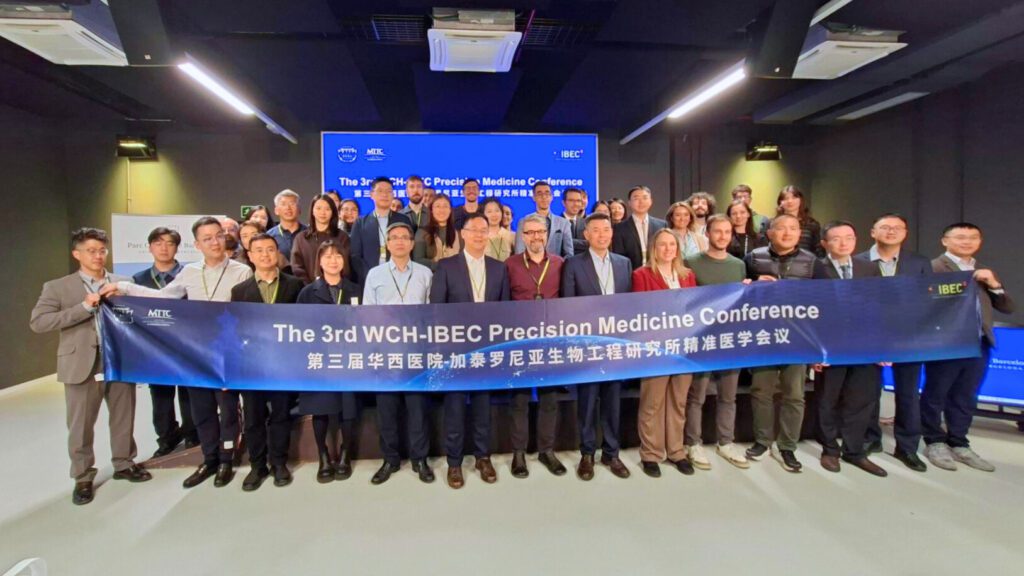
El IBEC y el Hospital West China celebran en Barcelona su tercera Conferencia conjunta de Medicina de Precisión
Esta semana ha tenido lugar en Barcelona la tercera Conferencia de Medicina de Precisión IBEC-WCH, un encuentro que consolidó la alianza estratégica entre el Instituto de Bioingeniería de Cataluña (IBEC) y el Hospital West China de la Universidad de Sichuan (WCHSU). La delegación china visitó España del 26 al 29 de noviembre, participando en un programa intensivo de actividades científicas, institucionales y de intercambio entre ambos centros.
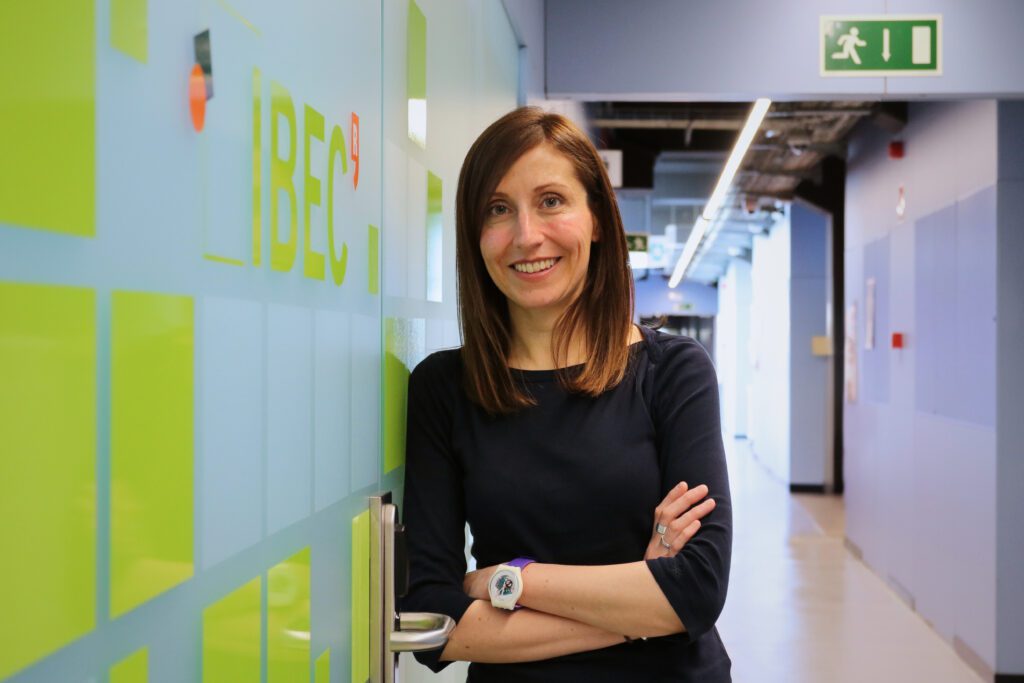
La Razón: «Nuestro chip evalúa si un fármaco puede llegar al cerebro de un determinado paciente»
Anna Lagunas, Investigadora del Instituto de Bioingeniería de Cataluña (IBEC), es una de las autoras del dispositivo que imita la barrera hematoencefálica.
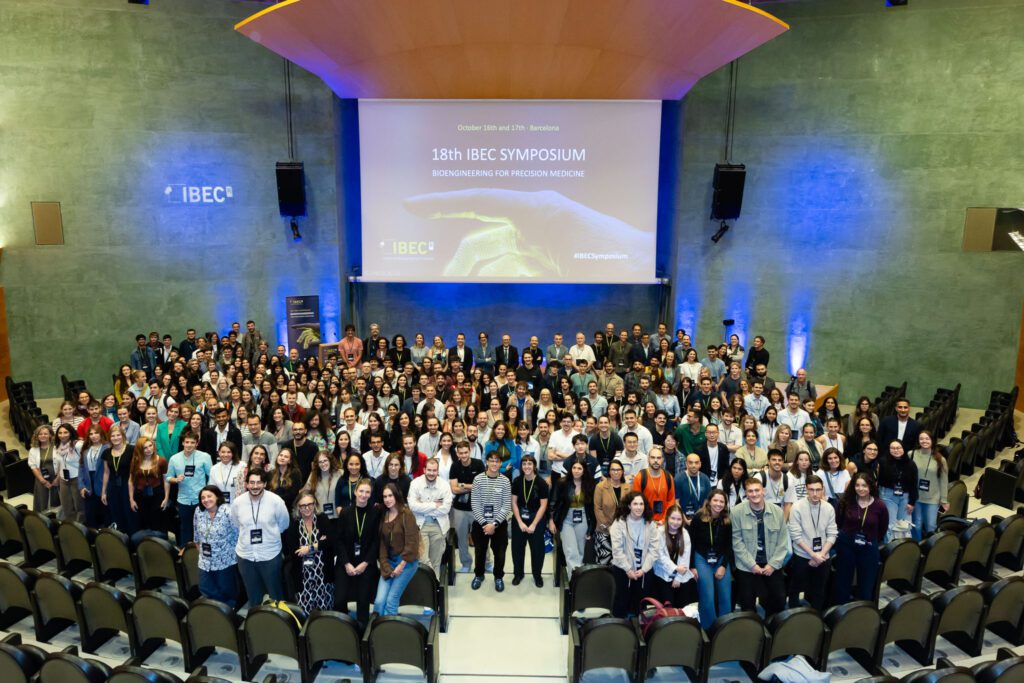
Bioingeniería para la medicina de precisión en el 18º Simposio del IBEC
El 18º Simposio anual del IBEC se centró en ‘Bioingeniería para la Medicina de Precisión’, una de las áreas clave de aplicación del IBEC. Fueron cerca de 300 las personas asistentes al evento, entre las que se encontraba personal investigador local e internacional. Un ambiente multidisciplinar en el que expertos y expertas de otros centros y la propia comunidad del IBEC tuvieron la oportunidad de presentar sus proyectos e intercambiar conocimiento.

LA VANGUARDIA: ¿Cómo mejorar el desarrollo de fármacos que lleguen al cerebro?
El IBEC diseña un chip que simula la barrera hematoencefálica.
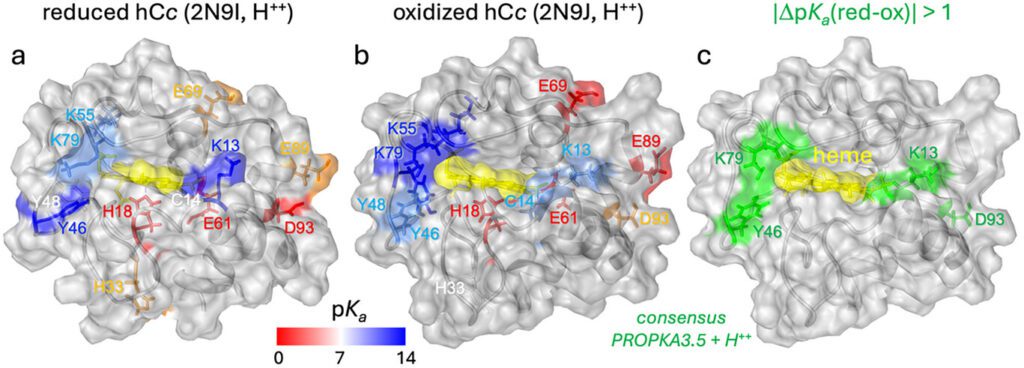
Descubierto un papel clave de los protones y los iones superóxido en la cadena respiratoria
Un estudio liderado por el Instituto de Bioingeniería de Cataluña (IBEC) revela que los protones y las especies reactivas de oxígeno son mediadores en el transporte de carga a larga distancia en la cadena respiratoria mitocondrial, un proceso fundamental en la respiración celular de los organismos. Comprender estos mecanismos es clave, ya que las mitocondrias actúan como la central energética de todas las células y su alteración se asocia a numerosas enfermedades.
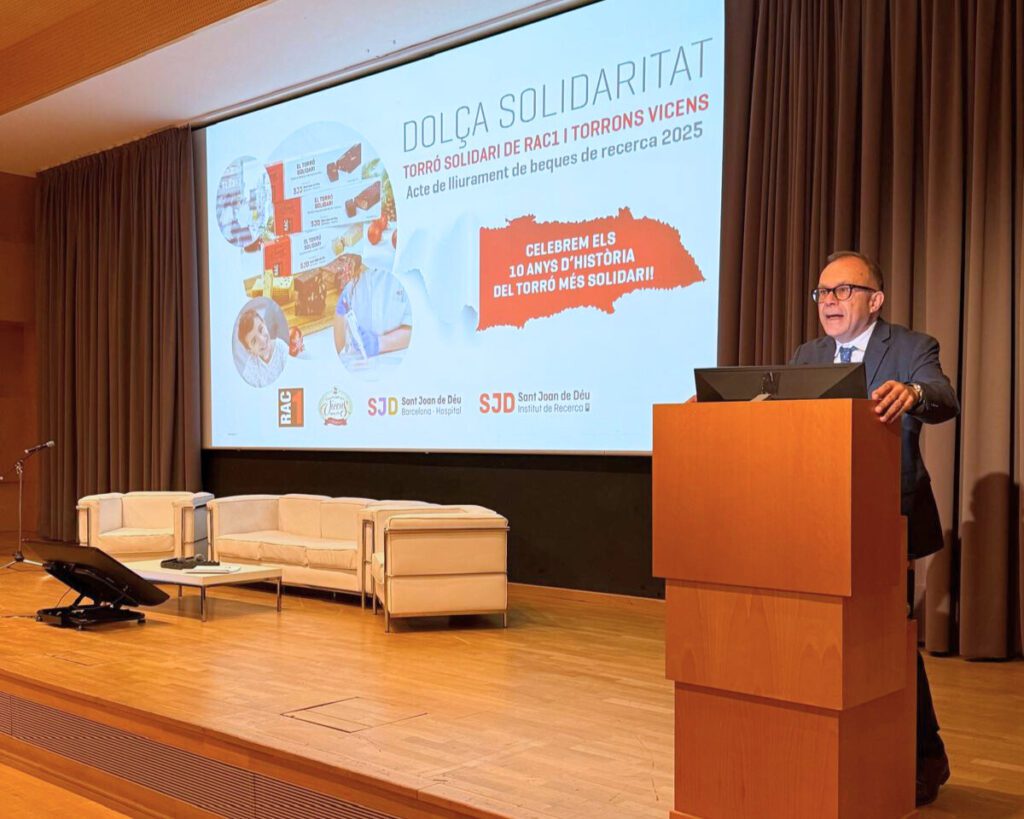
El IBEC codirigirá dos proyectos galardonados con las Becas Turrón Solidario de RAC1 y Torrons Vicens
Hoy ha tenido lugar el acto de entrega de las Becas Turrón Solidario de RAC1 y Torrons Vicens. En esta segunda convocatoria el Instituto de Bioingeniería de Cataluña (IBEC) ha sido seleccionado para codirigir dos de los cuatro proyectos galardonados. El objetivo de la convocatoria 2025 es estimular la investigación y la innovación en enfermedades minoritarias pediátricas en el Hospital Sant Joan de Déu bajo el paraguas del Proyecto «ÚNICAS».
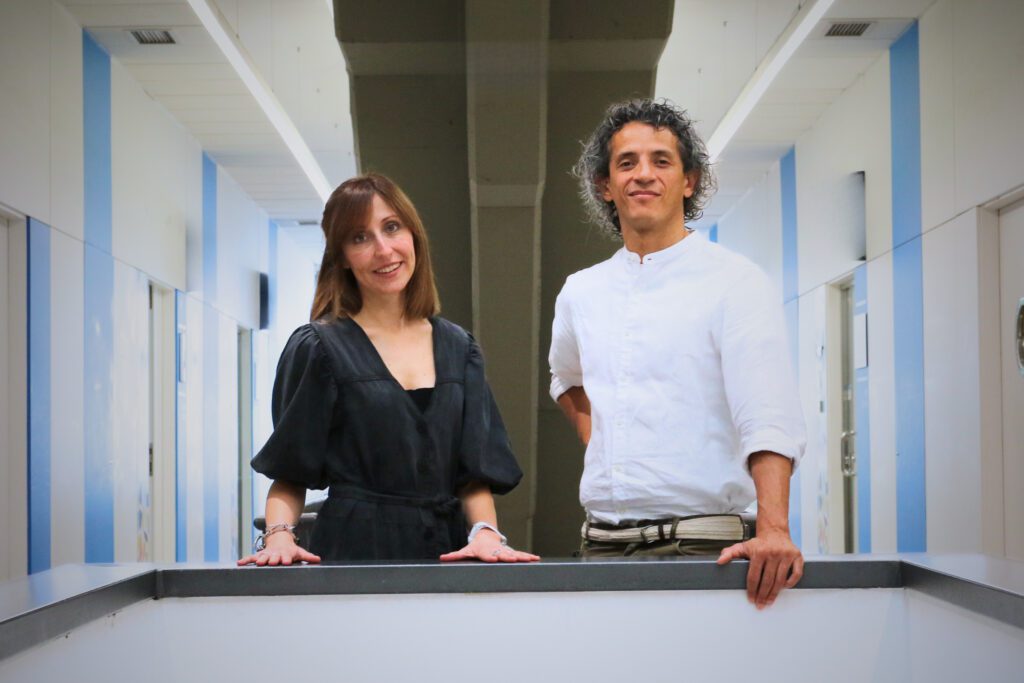
El IBEC liderará dos proyectos biomédicos del programa CaixaImpulse
Anna Lagunas y Daniel Gonzalez-Carter, ambos investigadores senior del Instituto de Bioingeniería de Cataluña (IBEC), liderarán sendos proyectos de la convocatoria 2025 del programa CaixaImpulse. La iniciativa de la Fundación “la Caixa” tiene como objetivo acelerar la llegada al mercado de innovaciones biomédicas para acercarlas a los y las pacientes que puedan necesitarlas. Los dos proyectos del IBEC se enfocan en el tratamiento de enfermedades que afectan al cerebro.
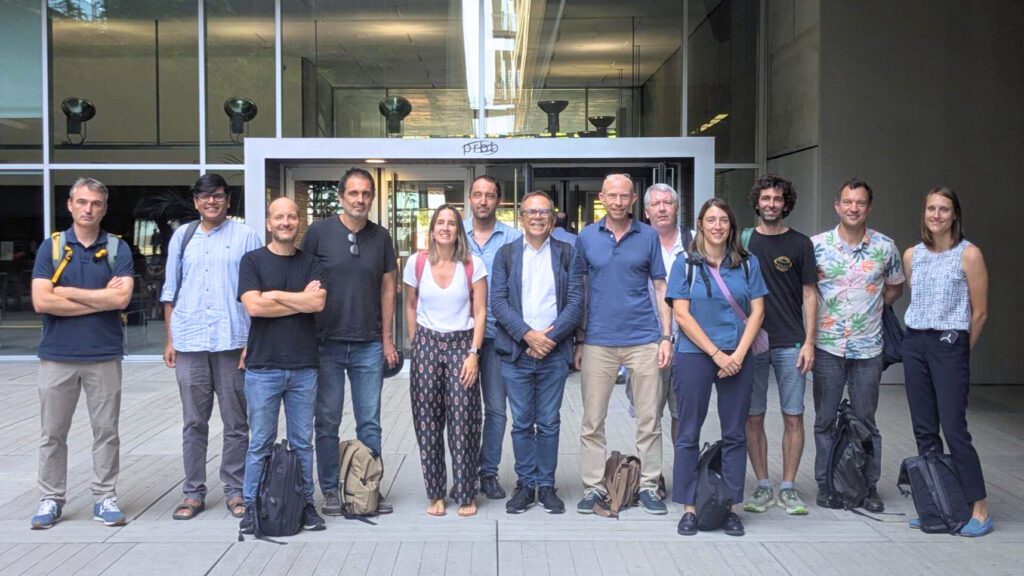
El IBEC y el EMBL Barcelona coorganizan una jornada de colaboración para explorar sinergias
El Instituto de Bioingeniería de Cataluña (IBEC) y el Laboratorio Europeo de Biología Molecular (EMBL) han celebrado hoy una jornada de “matchmaking”. El evento ha reunido a investigadores e investigadoras destacadas de ambos centros con el fin de fomentar la creación de nuevas conexiones y promover el diálogo científico.
Jobs
Laboratory Technician in Computational & Microfluidic Modelling at the Nanobiengineering Research Group
Ref: LT-AV // Deadline: 3/02/2026
Predoctoral Researcher in Bioengineering for Personalized Pediatric Oncology (Project Magneto)
Ref: FPI-AV // Deadline: 02/01/2026
Postdosctoral Researcher at the Nanobioengineering Research Group
Ref: JS-PR // Deadline: 27/12/2025
Laboratory Technician at the Nanobioengineering Research Group
Ref: LT-JS // Deadline: 18/10/2025
Senior Researcher at the Nanobioengineering Research Group
Ref: SR-JS // Deadline: 16/10/2025
Senior Researcher at the Biomaterials for neural Regeneration Research Group
Ref: SR_JS // Deadline: 04/08/2025
Laboratory Assistant at Nanobioengineering the Research Group Unit
Ref: LA-JS // Deadline: 15/04/2025
Research Assistant at the Nanobioengineering Research Group
Ref: RA-JS // Deadline: 26/08/2024
Laboratory Technician at the Nanobioengineering Research Group
Ref: LT_JS/Deadline: 22/01/2024


 ibecbarcelona.eu
ibecbarcelona.eu